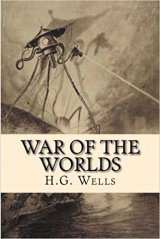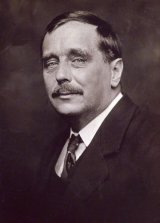The War of the Worlds Page #4
The War of the Worlds is a science fiction novel by English author H. G. Wells first serialised in 1897 by Pearson's Magazine in the UK and by Cosmopolitan magazine in the US.
Among these were a couple of cyclists, a jobbing gardener I employed sometimes, a girl carrying a baby, Gregg the butcher and his little boy, and two or three loafers and golf caddies who were accustomed to hang about the railway station. There was very little talking. Few of the common people in England had anything but the vaguest astronomical ideas in those days. Most of them were staring quietly at the big table like end of the cylinder, which was still as Ogilvy and Henderson had left it. I fancy the popular expectation of a heap of charred corpses was disappointed at this inanimate bulk. Some went away while I was there, and other people came. I clambered into the pit and fancied I heard a faint movement under my feet. The top had certainly ceased to rotate. It was only when I got thus close to it that the strangeness of this object was at all evident to me. At the first glance it was really no more exciting than an overturned carriage or a tree blown across the road. Not so much so, indeed. It looked like a rusty gas float. It required a certain amount of scientific education to perceive that the grey scale of the Thing was no common oxide, that the yellowish-white metal that gleamed in the crack between the lid and the cylinder had an unfamiliar hue. "Extra-terrestrial" had no meaning for most of the onlookers. At that time it was quite clear in my own mind that the Thing had come from the planet Mars, but I judged it improbable that it contained any living creature. I thought the unscrewing might be automatic. In spite of Ogilvy, I still believed that there were men in Mars. My mind ran fancifully on the possibilities of its containing manuscript, on the difficulties in translation that might arise, whether we should find coins and models in it, and so forth. Yet it was a little too large for assurance on this idea. I felt an impatience to see it opened. About eleven, as nothing seemed happening, I walked back, full of such thought, to my home in Maybury. But I found it difficult to get to work upon my abstract investigations. In the afternoon the appearance of the common had altered very much. The early editions of the evening papers had startled London with enormous headlines: "A MESSAGE RECEIVED FROM MARS." "REMARKABLE STORY FROM WOKING," and so forth. In addition, Ogilvy's wire to the Astronomical Exchange had roused every observatory in the three kingdoms. There were half a dozen flies or more from the Woking station standing in the road by the sand pits, a basket-chaise from Chobham, and a rather lordly carriage. Besides that, there was quite a heap of bicycles. In addition, a large number of people must have walked, in spite of the heat of the day, from Woking and Chertsey, so that there was altogether quite a considerable crowd--one or two gaily dressed ladies among the others. It was glaringly hot, not a cloud in the sky nor a breath of wind, and the only shadow was that of the few scattered pine trees. The burning heather had been extinguished, but the level ground towards Ottershaw was blackened as far as one could see, and still giving off vertical streamers of smoke. An enterprising sweet-stuff dealer in the Chobham Road had sent up his son with a barrow-load of green apples and ginger beer. Going to the edge of the pit, I found it occupied by a group of about half a dozen men--Henderson, Ogilvy, and a tall, fair-haired man that I afterwards learned was Stent, the Astronomer Royal, with several workmen wielding spades and pickaxes. Stent was giving directions in a clear, high-pitched voice. He was standing on the cylinder, which was now evidently much cooler; his face was crimson and streaming with perspiration, and something seemed to have irritated him. A large portion of the cylinder had been uncovered, though its lower end was still embedded. As soon as Ogilvy saw me among the staring crowd on the edge of the pit he called to me to come down, and asked me if I would mind going over to see Lord Hilton, the lord of the manor. The growing crowd, he said, was becoming a serious impediment to their excavations, especially the boys. They wanted a light railing put up, and help to keep the people back. He told me that a faint stirring was occasionally still audible within the case, but that the workmen had failed to unscrew the top, as it afforded no grip to them. The case appeared to be enormously thick, and it was possible that the faint sounds we heard represented a noisy tumult in the interior. I was very glad to do as he asked, and so become one of the privileged spectators within the contemplated enclosure. I failed to find Lord Hilton at his house, but I was told he was expected from London by the six o'clock train from Waterloo; and as it was then about a quarter past five, I went home, had some tea, and walked up to the station to waylay him. CHAPTER FOUR THE CYLINDER OPENS When I returned to the common the sun was setting. Scattered groups were hurrying from the direction of Woking, and one or two persons were returning. The crowd about the pit had increased, and stood out black against the lemon yellow of the sky--a couple of hundred people, perhaps. There were raised voices, and some sort of struggle appeared to be going on about the pit. Strange imaginings passed through my mind. As I drew nearer I heard Stent's voice: "Keep back! Keep back!" A boy came running towards me. "It's a-movin'," he said to me as he passed; "a-screwin' and a-screwin' out. I don't like it. I'm a-goin' 'ome, I am." I went on to the crowd. There were really, I should think, two or three hundred people elbowing and jostling one another, the one or two ladies there being by no means the least active. "He's fallen in the pit!" cried some one. "Keep back!" said several. The crowd swayed a little, and I elbowed my way through. Every one seemed greatly excited. I heard a peculiar humming sound from the pit. "I say!" said Ogilvy; "help keep these idiots back. We don't know what's in the confounded thing, you know!" I saw a young man, a shop assistant in Woking I believe he was, standing on the cylinder and trying to scramble out of the hole again. The crowd had pushed him in. The end of the cylinder was being screwed out from within. Nearly two feet of shining screw projected. Somebody blundered against me, and I narrowly missed being pitched onto the top of the screw. I turned, and as I did so the screw must have come out, for the lid of the cylinder fell upon the gravel with a ringing concussion. I stuck my elbow into the person behind me, and turned my head towards the Thing again. For a moment that circular cavity seemed perfectly black. I had the sunset in my eyes. I think everyone expected to see a man emerge--possibly something a little unlike us terrestrial men, but in all essentials a man. I know I did. But, looking, I presently saw something stirring within the shadow: greyish billowy movements, one above another, and then two luminous disks--like eyes. Then something resembling a little grey snake, about the thickness of a walking stick, coiled up out of the writhing middle, and wriggled in the air towards me--and then another.
Translation
Translate and read this book in other languages:
Select another language:
- - Select -
- 简体中文 (Chinese - Simplified)
- 繁體中文 (Chinese - Traditional)
- Español (Spanish)
- Esperanto (Esperanto)
- 日本語 (Japanese)
- Português (Portuguese)
- Deutsch (German)
- العربية (Arabic)
- Français (French)
- Русский (Russian)
- ಕನ್ನಡ (Kannada)
- 한국어 (Korean)
- עברית (Hebrew)
- Gaeilge (Irish)
- Українська (Ukrainian)
- اردو (Urdu)
- Magyar (Hungarian)
- मानक हिन्दी (Hindi)
- Indonesia (Indonesian)
- Italiano (Italian)
- தமிழ் (Tamil)
- Türkçe (Turkish)
- తెలుగు (Telugu)
- ภาษาไทย (Thai)
- Tiếng Việt (Vietnamese)
- Čeština (Czech)
- Polski (Polish)
- Bahasa Indonesia (Indonesian)
- Românește (Romanian)
- Nederlands (Dutch)
- Ελληνικά (Greek)
- Latinum (Latin)
- Svenska (Swedish)
- Dansk (Danish)
- Suomi (Finnish)
- فارسی (Persian)
- ייִדיש (Yiddish)
- հայերեն (Armenian)
- Norsk (Norwegian)
- English (English)
Citation
Use the citation below to add this book to your bibliography:
Style:MLAChicagoAPA
"The War of the Worlds Books." Literature.com. STANDS4 LLC, 2025. Web. 6 Jan. 2025. <https://www.literature.com/book/the_war_of_the_worlds_43>.




Discuss this The War of the Worlds book with the community:
Report Comment
We're doing our best to make sure our content is useful, accurate and safe.
If by any chance you spot an inappropriate comment while navigating through our website please use this form to let us know, and we'll take care of it shortly.
Attachment
You need to be logged in to favorite.
Log In